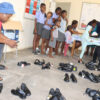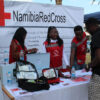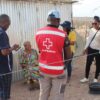The Namibia Red Cross Society (NRCS) was established through an Act of Parliament, (Namibia Red Cross Act), Act No. 16 of 1991, following Namibia’s independence, as a voluntary aid, auxiliary to the public authorities. The NRCS was officially recognised by the International Committee of the Red Cross (ICRC) in March 1993, and admitted as a member of the International Federation of Red Cross and Red Crescent Societies (IFRC) in October the same year.
The National Society‘s mission is to alleviate human suffering.
Namibia Red Cross Society is very unique in the Namibian context because of its auxiliary status to the public authorities. NRCS auxiliary status to the government is a particular kind of partnership afforded to the National Society because it is part of the Red Cross and Red Crescent Movement. This particular kind of partnership gives the opportunity to the Namibia Red Cross Society to consider any request by the government to carry out humanitarian activities within its mandate.
NRCS has been working alongside the government in meeting humanitarian needs both within Namibia and internationally, affording NRCS a unique position in the humanitarian sector and unique responsibilities. During the past years, NRCS’s relationship with the government has continued to grow from strength to strength. The Namibian government has been providing the National Society with technical and financial support since its establishment. NRCS has been working jointly with different government ministries and institutions including conducting trainings on International Humanitarian Law (IHL) with parliamentarians, new police recruits and members of the Namibia Defence Force. In addition, NRCS runs a number of health related projects that aims to address poverty reduction, HIV and AIDS, Orphans and Vulnerable Children (OVCs), TB and Malaria and many other related healthy challenges in an effort to supplement government in reducing/mitigating vulnerabilities.
Over the years, NRCS has secured great partnerships with other national societies such as Finnish, German, Canadian, American, Netherlands, Spanish, Swedish, Australia and Belgium Red Cross Societies, IFRC and ICRC with technical and financial support. The National Society is also supported by the European Union, Global Fund and UN agencies as well as various international funding agencies. The National Society is also in partnership with various local funders.
NRCS has offices in eight regions in the country but its services can be extended to all the country’s thirteen regions, in case of emergencies.
Public and private support from the Namibian community has been overwhelming as the Namibia Red Cross persists on maintaining trust and credibility in the society. The achievements over the years could not have been realised if it was not for NRCS stakeholders, donors and the Namibian community who have been contributing in various ways towards protecting human dignity by mobilising the power of the humanity.



